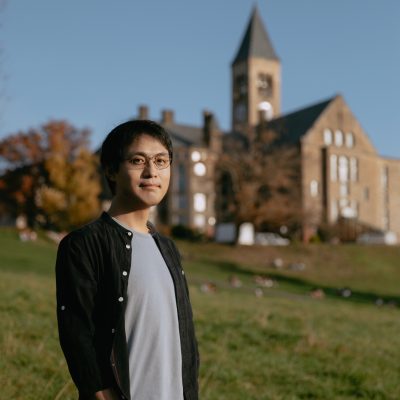Alumni Spotlight: Xiangkun (Elvis) Cao, Ph.D. ’21

April 11, 2022
Xiangkun (Elvis) Cao, Ph.D. ’21, is an alumnus of the mechanical engineering program at Cornell from Kong Zhuang, a small village in the northwest part of Jiangsu Province, China. After earning bachelor’s degrees in energy and power engineering and English literature from Xi’an Jiaotong University in China, a master’s degree in materials engineering from McGill University in Canada, and a Ph.D. at Cornell, he is now a postdoctoral fellow at the Massachusetts Institute of Technology (MIT) and an Impact Fellow at the MIT Climate & Sustainability Consortium. Cao is a 2022 Bouchet Scholar.
What was your research focus at Cornell?
My research in the Erickson Lab at Cornell centered around optofluidics, a research field that bridges “optics” and “microfluidics.” My Ph.D. thesis is titled “Light, Fluidics, and Their Applications in Global Sustainability and Health.” On the one hand, I developed a solar reactor technology called “HI-Light” to convert CO2 emissions into sustainable fuels and feedstocks to reimagine waste CO2 as a resource. On the other hand, I developed a microfluidic biosensor platform called “FeverPhone” to differentially diagnose febrile illnesses with overlapping symptoms (e.g., malaria and typhoid fever). Having the opportunity to work across disciplines was really a unique and rewarding experience.
What are the larger implications of this research and what is its impact?
My reactor work was featured as an energy breakthrough of the past decade by the World Economic Forum. The commercial partner in this effort was named a finalist in the $20M Carbon XPRIZE (one of 10 globally) and the Best CO2 Utilisation Award (one of six globally).
The diagnostic platform I developed was featured by NIBIB, and it was recently expanded to the differential detection of bacterial and viral infections. The rapid, portable, and low-cost nature of the platform offered potential for deployment in low-resource settings at the point-of-care.
Tell us about your current position and what you find rewarding about it.
I am currently an Impact Fellow (one of eight globally) at the MIT Climate & Sustainability Consortium (MCSC) and a postdoctoral fellow at the Hatton Research Group in the Department of Chemical Engineering at the Massachusetts Institute of Technology in Cambridge, Massachusetts. I am interested in upscaling various carbon capture, utilization, and storage (CCUS) technologies, at the intersection of the Hatton Research Group, the MCSC, and the MCSC industrial members. The most rewarding aspect of my current position is the opportunity to transcend academia and industry to enable near-term change for a more sustainable future.
What does it mean to you to be a Bouchet Scholar?
It has been a great honor for me to be selected as a Bouchet Scholar. As a first-generation, low-income (FGLI) student myself, I recognized that the obstacles I encountered were common among other minority groups: economic and social barriers, limited guidance from mentors and family members, and lack of courage to explore new pathways and opportunities due to self-doubt. I consider my selection into the Bouchet Society not only a recognition for my past advocacy and service in promoting the success of FGLI students, but also an opportunity for me to collaborate with like-minded scholars in this community to serve more minority groups in academia.
How do you exemplify the five pillars of the Bouchet Society – character, leadership, advocacy, scholarship and service?
The first person in my family to finish high school, I went on to land on Forbes 30 Under 30 for North America. This experience motivated me to advocate and support other FGLI students. I spoke about my experience “From poverty to college” in an interview by the China Current, published articles on Cell Press and the Lindau Nobel Meetings, and created a journal cover of my story published by the American Chemical Society.
Most recently, I served as a mentor in the Forbes Mentoring Program to support FGLI students in the U.S. and the ambassador for the “Tomorrow iCAN” plan to support 630 FGLI students from 23 high schools in China.
I would like kids who are growing up with similar backgrounds to see there’s someone like them out there so they know they can pursue seemingly impossible dreams as well.
What book is currently on your bedside table?
I found the book “The 7 Habits of Highly Effective People” by Stephen Covey very insightful, and I benefitted a lot by applying some habits from the book to my daily life. For example, as I described in my recent op-ed on Matter, I used the Eisenhower Decision Matrix to prioritize multiple efforts based on urgency and importance. With this matrix, we can classify tasks into four quadrants and handle them based on priority levels. And the ideal outcome is, as Eisenhower puts it, “I have two kinds of problems, the urgent and the important. The urgent are not important, and the important are never urgent.”
If you could go back in time to the beginning of your graduate career, what advice would you give yourself?
First, I would advise myself that even though graduate school is a perfect time to explore various career opportunities, I would probably benefit more by learning how to concentrate. During my Ph.D., I was involved in many activities outside of academic research: entrepreneurship, policymaking, science communication, and outreach, but I would probably be able to grow more by focusing on one or two tracks. The other piece I would give to myself is simply enjoy the journey. Looking back, I pursued my Ph.D. at Cornell during the best five years in my 20s, and I never regretted the decision to be in Ithaca, which now has a soft spot in my heart.

